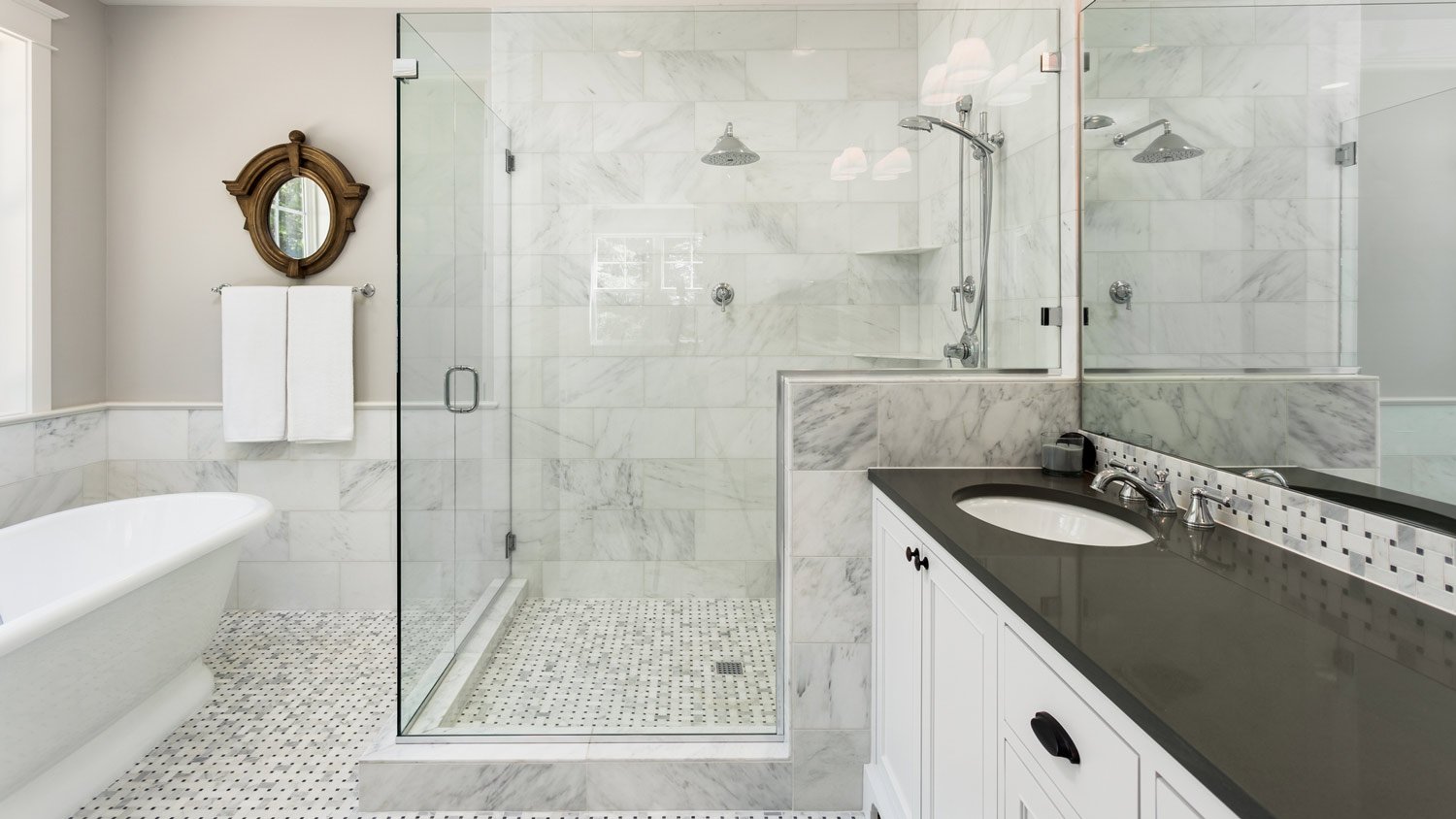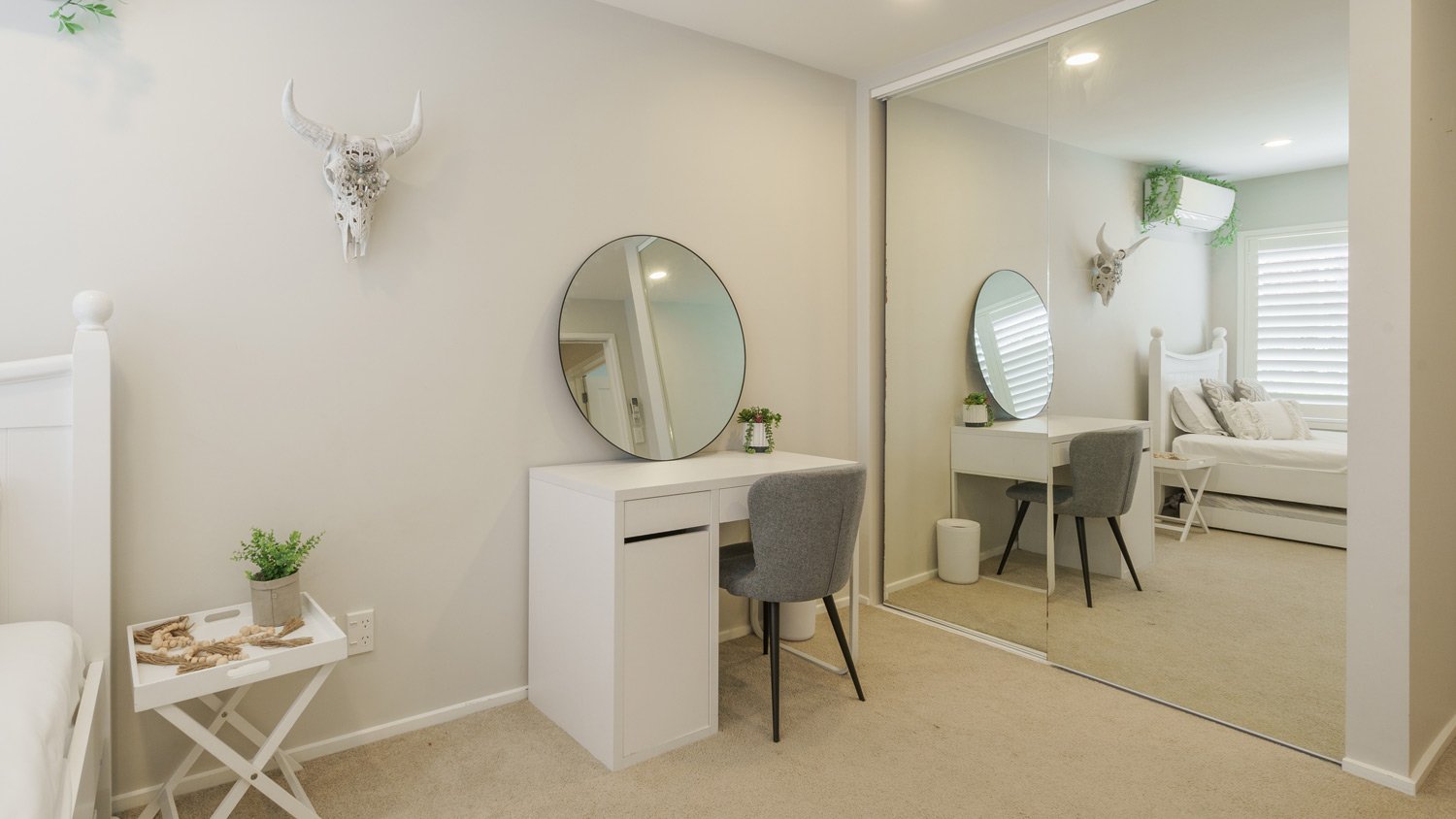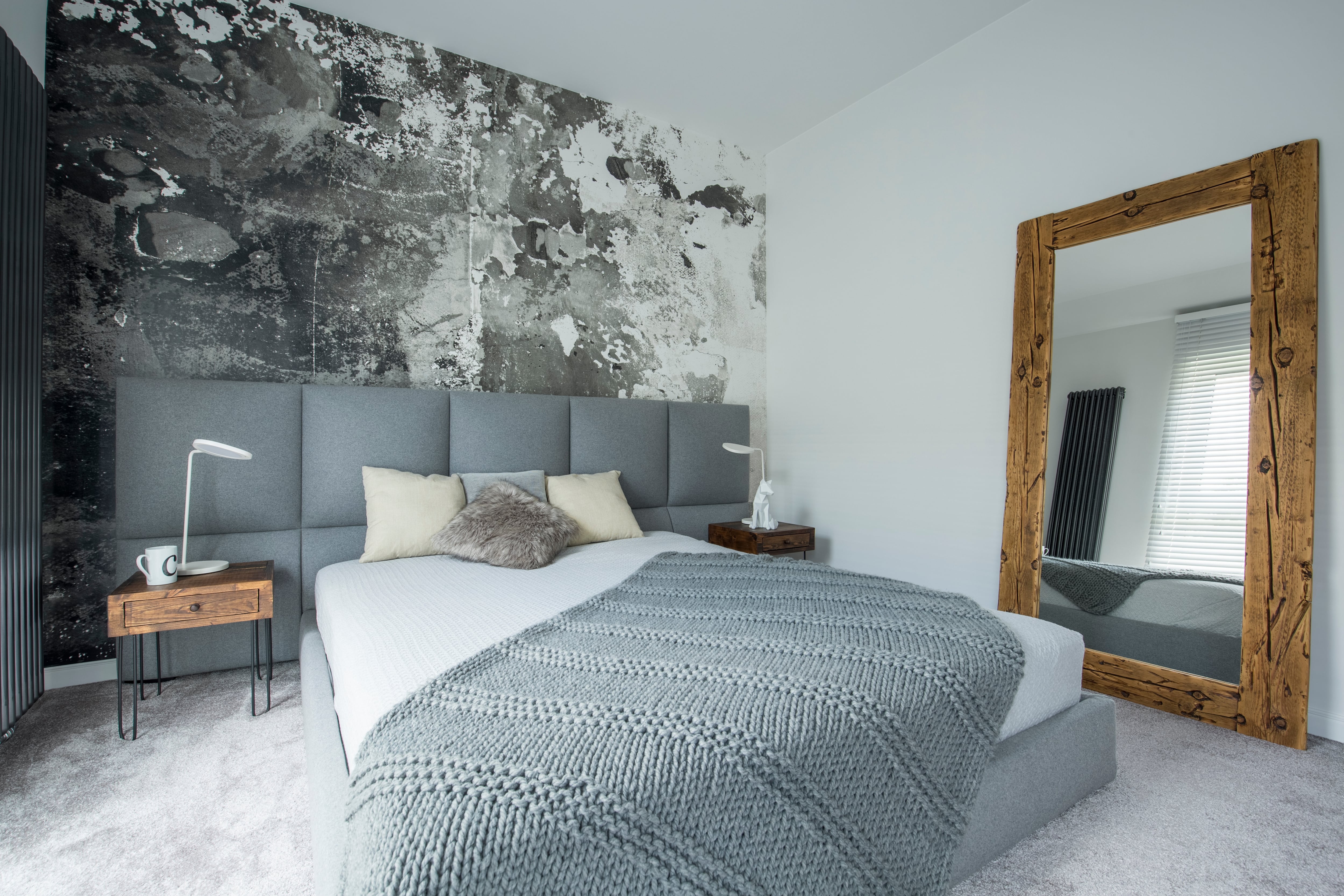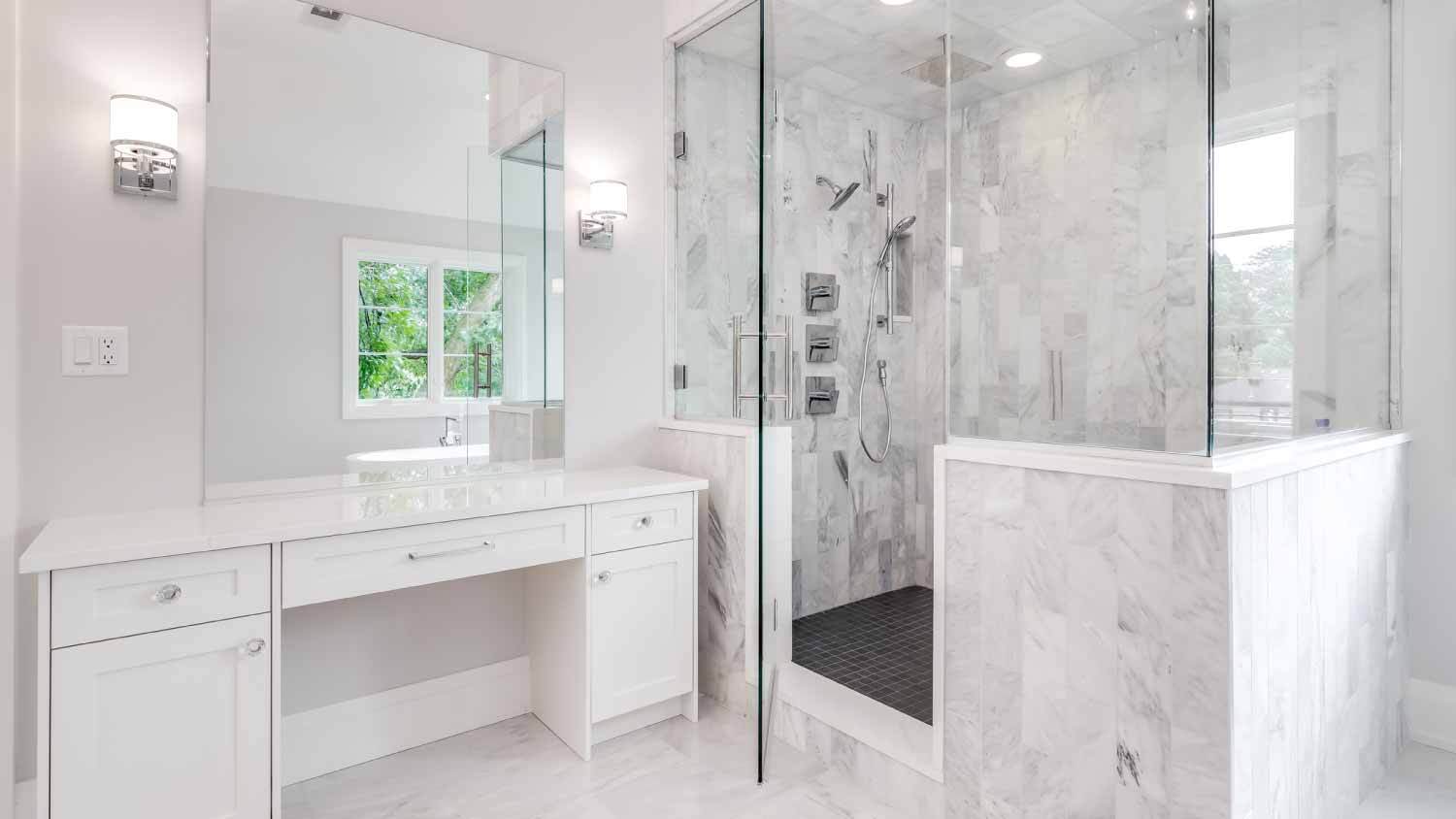
Discover the average shower door installation cost, including labor and materials, plus tips to save on your bathroom upgrade.
Wall mirror installation costs $120 to $7,000, with homeowners paying $1,250 on average, depending on mirror size, type, labor, and customization


Wall mirror installation costs depend on mirror size, type, and mounting complexity.
Wall mirror installation enhances light and space in any room, boosting home value and appeal.
Labor rates for wall mirror installation range from $50 to $100 per hour, and material costs can range from $15 to $50 per square foot for specialty mirrors.
Custom mirrors and specialty hardware increase total price.
Professional installation ensures safety and a flawless finish.
This article was created using automation technology and thoroughly fact-checked and edited by an Angi Editor in accordance with our AI policy.
Wall mirror installation cost averages $525 to $2,000, with most homeowners spending an average of $1,250 for a standard project. Prices vary based on mirror size, type, and labor rates. For custom or oversized mirrors, costs may exceed $7,000. Most installers charge per mirror, but some may quote by square foot for large or specialty installations. This guide explains what affects your total price and how to make the most of your investment.

The dimensions of your mirror play a major role in determining the final installation cost, which ranges from $20 to $50 per square foot. Larger mirrors require more materials, heavier-duty hardware, and more than one installer, all of which increase project price. Small mirrors are more affordable to install, while full-wall or oversized mirrors command premium rates due to complexity and labor.
Installers may charge per mirror for standard sizes or by square foot for custom or extra-large mirrors. Unusually shaped or oversized mirrors can bring additional charges due to special handling and mounting requirements.
| Mirror Size | Mirror Type | Dimensions (In.) | Average Cost |
|---|---|---|---|
| Small | Decorative | 24x36 | $100–$250 |
| Medium | Bathroom | 24x36–36x60 | $150–$500 |
| Large | Full-length | 36x60–48x96 | $500–$1,000 |
| Extra-large | Wall or gym mirror | 48x96+ | $500–$2,000+ |
The type of wall mirror you choose impacts both the look and the installation cost. The more customized the mirror or mounting, the higher your wall mirror installation cost will be.
Standard wall-hung mirrors are the simplest and least expensive, while custom-cut glass, beveled, or full-wall mirrors increase both labor and materials costs. Mounting method—adhesive, brackets, or specialty hardware—also affects the price and durability of the installation.
Special features like anti-fog coatings, integrated lighting, or safety glass can add to the cost but may offer greater value or safety. Each installation type has its own pros and cons depending on your space and needs.
| Mirror Type | Description | Cost Impact | Pros | Cons |
|---|---|---|---|---|
| Standard wall-hung | Commonly framed or frameless, small/medium | Low | Easy to replace, affordable | Basic appearance |
| Full-wall | Covers entire wall, often in gyms | High | Maximizes space, dramatic effect | Expensive, complex to install |
| Framed | Mirror with decorative frame | Moderate | Stylish, customizable | Frame adds to cost |
| Frameless | Clean, modern look, edges exposed | Low to moderate | Sleek, versatile | Edges prone to chipping |
| Beveled | Edged for decorative angle | Moderate | Elegant, finished look | Higher material cost |
| Custom-cut | Made to fit specific space/shape | High | Fits unique spaces, personalized | Expensive, non-returnable |
| Gym | Large, commercial-grade mirrors | High | Durable, safety features | Costly, heavy, needs pro install |
| Decorative | Unique shapes, patterns, or etching | Moderate to high | Artistic, focal point | May require custom mounting |
Wall mirror installation cost can vary widely based on where you live and where the mirror is going within your home. Urban areas and high-cost-of-living cities generally have higher labor rates and supply costs, while rural or less populated areas may offer lower prices but fewer installer options. Some pros charge travel fees or minimum service charges, especially for remote locations.
Within your home, the installation area also matters. Bathrooms and bedrooms are straightforward, while living rooms, hallways, or home gyms can pose challenges due to size, wall type, or accessibility. Installing a mirror on a second story or in a tight stairwell increases labor and may require special equipment, raising the price. For some rooms, wall prep or reinforcement (especially for heavy or large mirrors) adds to the total.
Several factors influence your final wall mirror installation cost, from the professional you hire to the features you select.
Handypeople, glaziers, and general contractors all install wall mirrors, with hourly labor rates from $50 to $150, or minimum service fees of $100 to $200. When you hire a local mirror installer, they may charge labor per mirror, per hour, or per square foot for large or complex jobs. Mirrors that are especially heavy, require multiple installers, or need mounting on tile, masonry, or reinforced walls will increase labor costs. Urban areas and regions with higher living costs see higher labor rates.
Permits are rarely required for residential wall mirror installation, but they may be needed for large commercial projects, structural changes, or if new electrical work is integrated. Contractors often handle permits, but it’s wise to confirm whose responsibility it is before work begins.
Certain features add to your mirror installation costs, including:
Framing: $80–$250
Polished edges: $70–$300
Integrated lighting: $100–$500
Project complexity, such as installing multiple mirrors or working around wall obstacles, raises costs. Hard-to-reach areas, high ceilings, or tight spaces may require scaffolding or extra labor. Wall repairs, painting, or delivery logistics add to your bottom line. Some installers charge for mirror removal, post-installation cleanup, or design consultation.
Beyond installation, consider these ongoing or one-time expenses that affect your wall mirror project.
Many manufacturers or installers offer warranties covering defects in glass or installation issues, often included in the price. Extended warranties add peace of mind but are not always necessary for standard mirrors.
Mirrors with integrated lighting or smart features require electricity, adding a minor amount to your utility bill. Smart mirrors or those with anti-fog features may require occasional software updates or maintenance.
Wall mirrors need regular cleaning with non-abrasive products. Hardware and mounting checks should be done annually, with minor maintenance (like tightening brackets or resealing edges).
Expect to pay sales tax on both materials and labor, with rates from 5% to 10% depending on your location. This can add $10 to $200 or more to your total wall mirror installation cost.
Large or commercial mirrors may require extra insurance during installation. Professional installers carry liability insurance, which is included in their rate. Homeowners should check their own insurance for coverage in case of accidental damage during installation.
Many homeowners consider DIY to save on labor, but wall mirror installation comes with risks and hidden expenses. Installing a wall mirror yourself means buying materials, hardware, and possibly renting tools. Labor is your own time, but mistakes can increase costs if the mirror breaks or is installed incorrectly.
You’ll need basic handyman skills, a level, drill, wall anchors, measuring tape, and safety gear (like gloves and goggles). Large or heavy mirrors often require two people.
For large or more complex wall mirror installations, working with a professional mirror installer is best. Mirrors mounted on tile, masonry, or in challenging spaces also necessitate professional help. Improper installation risks mirror breakage, wall damage, or injury, and DIYing can void warranties or insurance if not done to code or manufacturer specifications. A pro ensures safe installation to protect you and your investment.
When your wall mirror is damaged or loose, you’ll need to decide between repair or replacement. Minor scratches, chips, loose mounting, or small hardware issues can usually be repaired for a modest fee. If the mirror is cracked, shattered, has failed mounting, or looks outdated, replacement is the safer and more attractive option. Mirror age, warranty status, and the extent of damage will guide your decision.
Minor mirror repairs like re-mounting, edge polishing, or hardware replacement cost $50 to $150. Use the 50% rule: if repairs would cost more than half the price of a new mirror, replacement is the better investment. Matching existing mirrors or décor may be difficult with repairs. Upgrading to modern, safer mirrors (such as tempered glass) is a smart choice if your mirror is very old or was not professionally installed.
Adding or upgrading wall mirrors can provide a meaningful return on investment (ROI) by making spaces look larger, brighter, and more appealing to buyers.
Wall mirror installation can deliver an ROI of 50% to 70%, especially in bathrooms, entryways, and bedrooms. Mirrors increase perceived space and natural light, making your home more inviting. Compared to other home improvements, mirrors are a relatively low-cost way to boost appeal.
Safety upgrades, like tempered glass and secure mounting, protect your family and property. Mirrors can improve energy efficiency by reflecting more light, reducing the need for extra lighting. Functional upgrades, such as anti-fog features or universal design, add usability. Stylish mirrors raise your home’s resale appeal, especially when coordinated with modern décor.
Keep your budget in check with these cost-saving tips for your wall mirror installation:
Get multiple quotes from local mirror installers to compare pricing.
Choose standard-size mirrors instead of custom designs.
Install mirrors in accessible locations to reduce labor charges.
Opt for simpler mirror mounting hardware and finishes.
Schedule mirror installation during off-peak times for potential discounts.
Reuse existing mirror hardware or frames when possible.
Bundle mirror installation with other home improvement projects for savings.
Home is the most important place on earth, which is why Angi has helped more than 150 million homeowners transform their houses into homes they adore. To help homeowners with their next project, Angi provides readers with the most accurate cost data and upholds strict editorial standards. We extensively research project costs to develop the pricing data you see, so you can make the best decisions for you and your home. We rely on reputable sources, including the U.S. Bureau of Labor Statistics, academic journals, market studies, and interviews with industry experts—all to ensure our prices reflect real-world projects.
Want to help us improve our cost data? Send us a recent project quote to [email protected]. Quotes and personal information will not be shared publicly.
From average costs to expert advice, get all the answers you need to get your job done.

Discover the average shower door installation cost, including labor and materials, plus tips to save on your bathroom upgrade.

Discover the cost to install a custom-cut mirror in your home. Discover price factors, installation options, and expert tips to save on your custom mirror project.

Find out the average glass wall cost, including installation, materials, and ways to save. Get transparent pricing and tips for your glass wall project.

Discover the cost to resilver a mirror, including average prices, key cost factors, and tips to help you budget and save on your mirror restoration project.

The standard bathroom mirror size is 24 by 36 inches, but dimensions can vary drastically. Read this guide to discover how to measure for a bathroom mirror.

Interested in glass cutting? Here's what you can expect to pay to cut glass to a custom size or shape for a table, countertop, mirror, window, or shower.